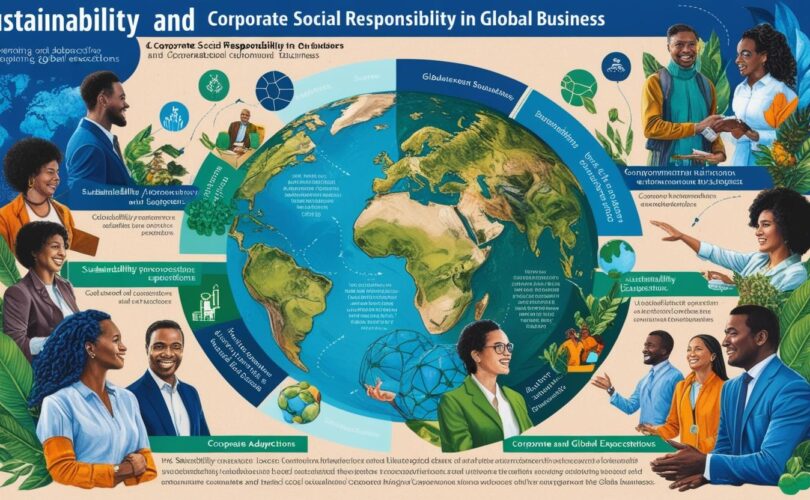In today’s interconnected world, the importance of sustainability and Corporate Social Responsibility (CSR) in global business cannot be overstated. As businesses operate across diverse geographical and cultural landscapes, they must navigate a complex web of local and global expectations.
The Evolving Landscape of CSR
CSR has transformed from a voluntary attribute to a crucial element of business strategy. Companies are no longer judged solely on their financial performance but also on their social and environmental impact. As Paul Polman, the former CEO of Unilever, once stated, “The future of business is not just about making money, but about making a difference.”
Key Components of CSR
CSR encompasses several key areas:
Environmental Responsibility
Companies must prioritize environmental stewardship by reducing pollution, recycling materials, and replenishing natural resources. For instance, Google aims to operate on 24/7 carbon-free energy by 2030 and has already achieved carbon neutrality since 2007.
Ethical Responsibility
Ethical responsibility involves fair treatment of all stakeholders, including employees, customers, and suppliers. This includes favorable pay and benefits, full disclosures, and transparency for investors. Bank of America’s decision to raise its minimum wage to $20 an hour is a prime example of this commitment.
Philanthropic Responsibility
Philanthropy is a vital component of CSR, where companies contribute to society through donations, employee volunteering, and supporting nonprofit organizations. Cisco’s ‘Cisco Networking Academy’ provides IT education and career pathways to millions of individuals, empowering them with digital skills for the future.
Financial Responsibility
Financial responsibility involves making investments in programs and initiatives that support sustainability, diversity, and social awareness. Patagonia’s ‘1% for the Planet’ initiative, where 1% of sales are redistributed to fund international grassroots environmental projects, is a model for economically responsible decision-making.
Benefits of Integrating CSR
Integrating CSR into business operations offers numerous benefits:
Enhanced Brand Image
Companies that practice CSR are perceived as more ethical and responsible, attracting loyal customers and investors. As consumers increasingly support businesses that align with their values, CSR becomes a competitive advantage.
Improved Investor Relations
Companies that are leaders in environmental, social, or governance matters often enjoy a valuation premium over their competitors. A study by the Boston Consulting Group found that such companies had an 11% valuation premium.
Increased Employee Satisfaction
CSR initiatives can boost employee satisfaction and retention. When employees see their company making a positive impact, they are more likely to be engaged and committed to the organization.
Adapting to Local Expectations
While global standards are important, businesses must also adapt to local expectations and regulations. In some regions, CSR is legally mandated; for example, in Mauritius, Nepal, and India, corporate philanthropy is required by law.
Case Studies of Successful CSR
Several companies have set benchmarks for CSR:
– Starbucks: Through its ‘Coffee and Farmer Equity (C.A.F.E.)’ program, Starbucks supports coffee farmers, promotes sustainable agriculture, and ensures fair labor practices throughout its supply chain.
– Tesla: Tesla’s mission to accelerate the world’s transition to sustainable energy is central to its CSR efforts, with a focus on innovative products like electric vehicles and solar energy solutions.
– Unilever: Unilever’s Sustainable Living Plan is a comprehensive strategy that addresses environmental and social challenges, prioritizing sustainability across its brands and operations.
Conclusion
In the words of John Mackey, co-founder and former CEO of Whole Foods Market, “The best way to get started is to quit talking and begin doing.” As global businesses, it is imperative to not just talk about sustainability and CSR but to integrate these principles into the core of our operations.
By doing so, we not only contribute to a more sustainable and equitable world but also build loyal customer bases, attract responsible investors, and enhance our brand reputation.
Promoting Responsible Business Practices with Samunnati Ventures
At Samunnati Ventures, we specialize in guiding businesses across various industries in developing and implementing robust CSR and sustainability strategies. With over 20 years of experience in feasibility studies, business plans, financial modelling, and corporate strategy, we help our clients navigate the complexities of global business while adhering to local and global expectations. Contact us to learn how we can support your journey towards a more sustainable and responsible business model.







